I have an Albacore model submarine which I have not used in a number of years now and want to get back to it. The model has aft diving planes only and I want to add forward diving planes. My question is: do the planes interact in such a way as to push the bows down while pushing the stern up (and visa versa), or do both fore and aft planes push the bows and the stern in the same direction? I rather fancy using them to push the bows and stern in the same direction in order to keep the submarine horizontal at all times. Can anyone give me some advice please? Thanks. Brian
Who is online?
In total there are 27 users online :: 0 Registered, 0 Hidden and 27 Guests
None
Most users ever online was 180 on Tue Nov 05, 2019 6:03 am
Latest topics
Search
Most Viewed Topics
Statistics
Our users have posted a total of 12476 messages in 1986 subjects
We have 1017 registered users
The newest registered user is Bazdiving
Similar topics
3 posters
fore and aft diving vanes

Brian Adley- Guest
- Posts : 2
Join date : 2012-07-30
Age : 77
Location : Cape Town, South Africa
- Post n°1
 fore and aft diving vanes
fore and aft diving vanes
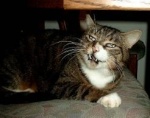
Hermann- AMS member
- Posts : 119
Join date : 2011-07-03
Location : at home, near Bremen (Germany)
- Post n°2
 Re: fore and aft diving vanes
Re: fore and aft diving vanes
Hello Brian,
the effect depents on the relationship between the control of the fore and aft diving planes.
When they are controlled in a manner to be parallel to each other (e.g. both front edges tilted down) the dynamic force will act on the bow section and the stern section in the same way and your model will descent or ascent on more or less even keel. The residual inclination will depend upon th ebalance between the fore and aft planes.
When operated with contrary control (e.g. the bow planes point down and the aft planes point up) the inclination of your model will be even greater compared to the use of the aft planes only.
Fore planes will give some benefit when submerging from the surface. With action of the aft planes only (with the front edges oft aft planes tilted up) the stern will be lifted to make the bow point downwards. With some models it can happen that the propeller comes partially out of the water, this will reduce the propulsion effect. With support of the fore planes operated contrary (their front edges pointing down) the bow is forced down by the dynamic force and this will help to submerge better.
If possible with your radio control it would be useful to programme your transmitter in a manner to select between the two operation modes parallel action and contrary action of the fore and aft planes by means of a switch.
kind regards
Klaus-Dieter
the effect depents on the relationship between the control of the fore and aft diving planes.
When they are controlled in a manner to be parallel to each other (e.g. both front edges tilted down) the dynamic force will act on the bow section and the stern section in the same way and your model will descent or ascent on more or less even keel. The residual inclination will depend upon th ebalance between the fore and aft planes.
When operated with contrary control (e.g. the bow planes point down and the aft planes point up) the inclination of your model will be even greater compared to the use of the aft planes only.
Fore planes will give some benefit when submerging from the surface. With action of the aft planes only (with the front edges oft aft planes tilted up) the stern will be lifted to make the bow point downwards. With some models it can happen that the propeller comes partially out of the water, this will reduce the propulsion effect. With support of the fore planes operated contrary (their front edges pointing down) the bow is forced down by the dynamic force and this will help to submerge better.
If possible with your radio control it would be useful to programme your transmitter in a manner to select between the two operation modes parallel action and contrary action of the fore and aft planes by means of a switch.
kind regards
Klaus-Dieter
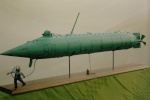
merriman- Guest
- Posts : 347
Join date : 2011-10-16
Age : 75
Location : Virginia Beach, Virginia
- Post n°3
 Re: fore and aft diving vanes
Re: fore and aft diving vanes
Brian Adley wrote:I have an Albacore model submarine which I have not used in a number of years now and want to get back to it. The model has aft diving planes only and I want to add forward diving planes. My question is: do the planes interact in such a way as to push the bows down while pushing the stern up (and visa versa), or do both fore and aft planes push the bows and the stern in the same direction? I rather fancy using them to push the bows and stern in the same direction in order to keep the submarine horizontal at all times. Can anyone give me some advice please? Thanks. Brian
Keep the bow and stern planes on separate channels. Let the angle-keeper tend the stern planes. You drive the bow planes for depth control.
No one on this planet has assembled and operated more 1/60 ALBACORES than me. As with most submarines the stern planes of the ALBACORE have the long moment arm to effect angle changes to the boat. The bow planes don't, so they dynamically pull the boat up or down (they do have a pitch moment, but no where the magnitude of the stern planes). If you're transmitter is smart enough to provide channel mixing then go ahead and dial in about 10% coupling between the two horizontal control surfaces -- collectively, not differentially!
Do not mechanically couple the bow and stern plane linkages to free up a channel -- that's a fools errand as the boat will only work well at one specific speed and depth, but will be a wild pony ride in all other situations.
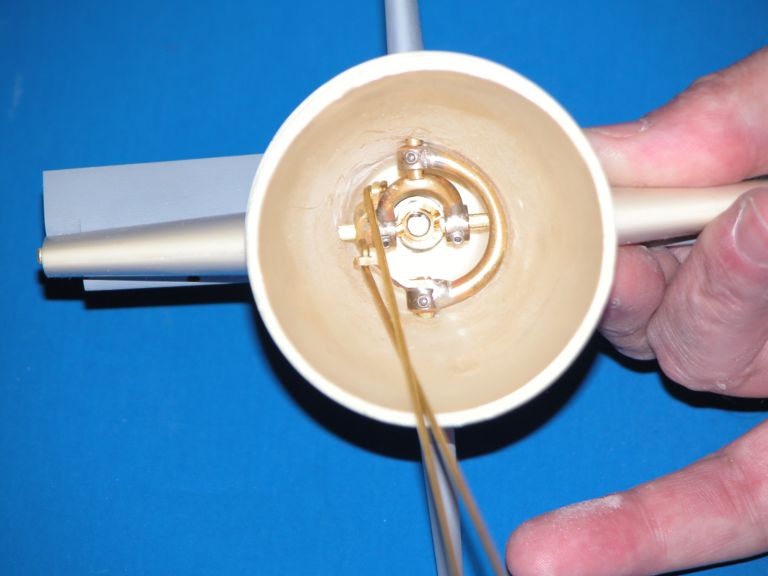
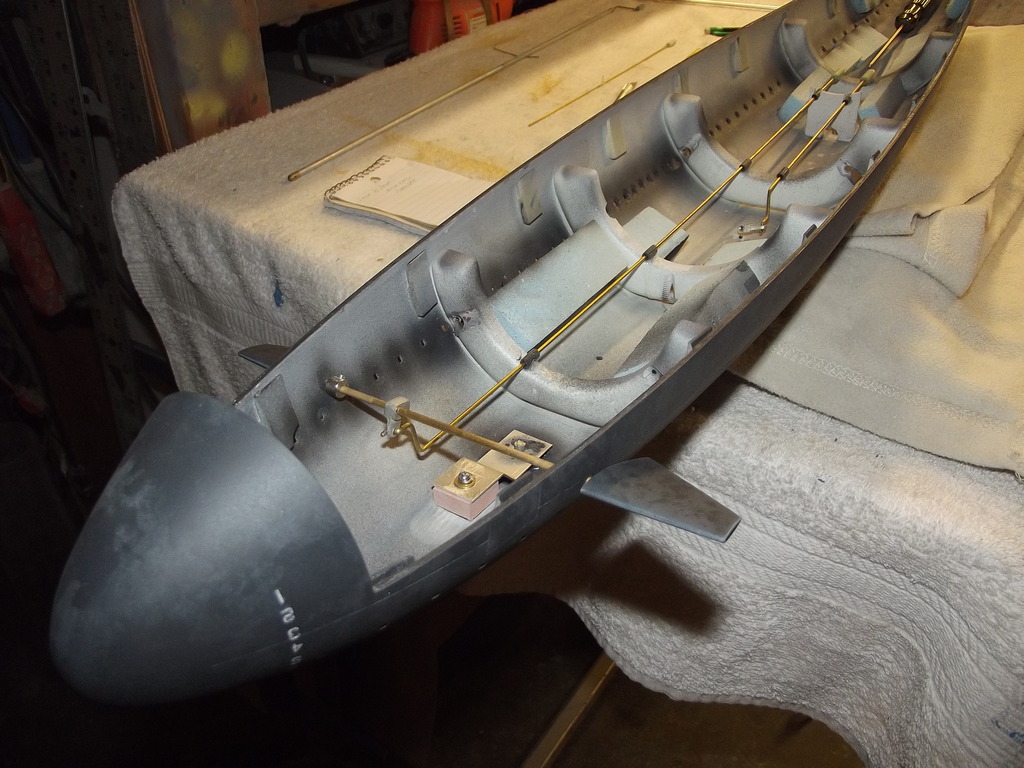
https://s262.photobucket.com/user/dmeriman/slideshow/albacore
Here's how the boat works when you do it as I describe:
https://www.youtube.com/watch?v=G53StePB0RY
https://www.youtube.com/watch?v=DhAG-7W_5kA
https://www.youtube.com/watch?v=TSr41K5Uaj4
https://www.youtube.com/watch?v=3RnfxJINK3U
https://www.youtube.com/watch?v=7uvc6jtU2cM
David

Brian Adley- Guest
- Posts : 2
Join date : 2012-07-30
Age : 77
Location : Cape Town, South Africa
- Post n°4
 Re: fore and aft diving vanes
Re: fore and aft diving vanes
Thank you folks. I was about to make some mistakes by the looks of it as I was going to link the fore and aft planes together on the same servo. Not sure where the additional servo will go if they are individually controlled but that's to be investigated. I see from the photos that the linkage to the forward planes seems to go through the rear of the pressure hull. I was going to take it through the front by means of a flexible linkage over the top of the ballast tank. More to think about. Brian
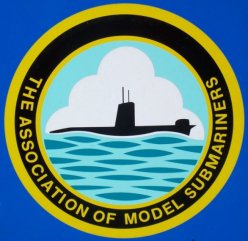


» Futaba -868/915mhz equipment
» Darnell type 21 submarine, need some help
» Robbe Seawolf V2
» bladder bags
» WW2 mini sub build
» Peral Submarine of 1888
» U-Boat R/C?
» Cheap Arduino Auto leveler